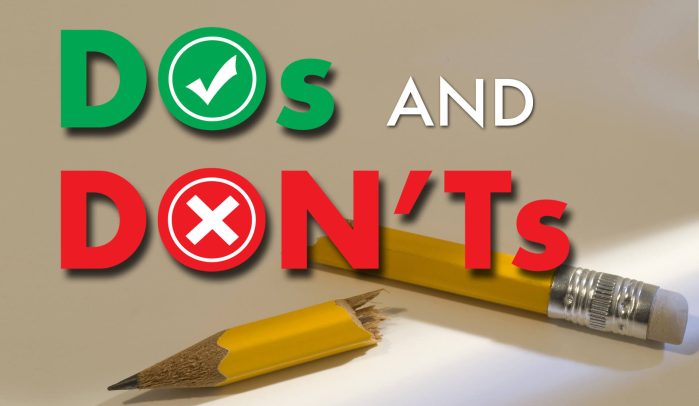UPDATED JULY 9, 2024
Working with a copywriter?
Working with a copywriter can do incredible things for your business: transforming your copy from bland to brand, engaging and informing your target audience, and generating more leads, enquiries and sales.
If you want to get the best out of your copywriter, your working relationship with your copywriter, and the copy your copywriter writes for you, keep on reading.
In this article I’ve compiled a list of dos and don’ts for working with a copywriter, with my own insights and contributions from the lovely copywriting community on LinkedIn.
How to work with a copywriter
General dos and don’ts
Let’s start off with some general dos — and a don’t — that can apply to any project.
✅ Treat your copywriter as a trusted partner
A copywriting project should be a collaboration. Your expertise in your business paired with your copywriter’s expertise in communication. And when they come together, that’s when the magic happens.
Ultimately, we’re both working towards the same goal, but we’re looking at that goal from different angles. You, from the side of your business and your copywriter, from the side of your audience.
Treating your copywriter as a trusted partner, rather than just a hired help, will mean you have a better, more collaborative and more respectful working relationship. A relationship that will result in great things for your business.
✅ Welcome our input and ideas
Many of us have been copywriting for a long time and we have a lot of knowledge, experience and value we can bring to your project. When you work with us, you can take full advantage of that.
✅ Ask us for recommendations
Copywriters are good networkers and are often connected with lots of other freelancers from lots of other disciplines. So if your project also needs a web designer, graphic designer, photographer or SEO consultant we might be able to recommend someone good.
❌ Don’t underestimate the process
“Anyone can write, right? It’s just a case of sitting down at your computer and typing. So why does it take so long and cost so much?”
Trust us, we get this a lot.
Yes, anyone can write. But copywriting is so much more than just writing. It takes a lot of research, too. Around 70-80% of any project is spent researching what to write. Then there’s positioning, idea generation, SEO, tone of voice work… the list goes on.
The process is way more involved than you might think — and not just anyone can do it — which is why working with a copywriter makes such a lot of sense.
Onboarding
This section shows you how to work with a copywriter during the onboarding process. This is the part where we’re talking, setting out proposals and quoting you for the work you need.


✅ Be open about your budget
If you have a restrictive budget, let’s talk about pricing upfront and save ourselves some time and effort.
✅ Expect to pay money upfront
Most freelance copywriters charge at least 50% of their fee upfront. For smaller amounts, it may be 100% upfront.
❌ Don’t tell us you could get it cheaper on Fiverr
We already know you could get it cheaper on Fiverr — and there’s a reason for that. If you want Fiverr prices, go straight to Fiverr and don’t waste our time.
❌ Don’t take too long to approve your quote
Freelance copywriters can raise their prices whenever they choose to, so most only guarantee their quote price for a month. If you respond to a quote six months after it was given, you may find the price has gone up.
The copywriting brief
The brief is a list of questions that covers everything we need to know to deliver your project. In the brief, we’ll ask you about your brand, your tone of voice, your audience and your competitors. We’ll also ask you about your project and what you want to achieve.
If you’re used to working with copywriters, you may have your own briefing document. If not, most copywriters will have a brief you can use to tell them about your project.


✅ Make sure you know what you want
Being clear about what you want will mean we’re all on the same page and working towards the same goal.
If you don’t know what you want, you’ll find it very difficult to brief your copywriter.
If you’re not sure what you want before we start, talk to us. Most copywriters will be happy to provide some prompts and examples, or pitch some ideas, to get you started and help you decide.
✅ Give your copywriter a good brief
This is your chance to tell us everything you want us to know about you and your project, so don’t spare the details! Too much information is always better than too little.
If you’re not sure how to complete the brief, or you’d prefer your copywriter to take you through the process, book some time with us and let us guide you through it.
✅ Be clear about your audience and their needs
Everything we write will be for the benefit of your audience, so the more you can tell us about them, the better.
Information that will be useful to us includes:
- Who they are — age, gender, location, job title
- Where they hang out online — forums, groups, social media
- How much they know about your product/service
- What problems/desires/outcomes they’re looking for.
✅ Tell us about your competitors
Not so we can copy them — we’re copywriters, not copycats!
But understanding them helps us to differentiate you and get your positioning right. It’s all to give you the best chance of success in your market.
Tell us how and why you’re different to them. Tell us what you think they do well — and what they don’t do so well. Tell us what you like about their copy — and what you don’t like.
It all helps us to build a clear picture.
✅ Be clear about your benefits, USP and value proposition
When you’re working with a copywriter, it’s important to understand these three things, because they’ll be instrumental in persuading your prospects to buy from you.
- Benefits are the reasons why your prospects should use your product or service
- Your USP is your Unique Selling Point — the thing that makes you different
- Your value proposition is the reason why your prospects should specifically choose you and not your competitors.
✅ Send any accompanying information
Accompanying information could be any relevant research, data or insights to inform the copy or help fulfil its objectives.
You can include information from other places, such as existing product descriptions, user manuals, FAQ sections and help files.
It takes time for us to find all these things and, in some cases, you could end up being charged more for that.
✅ Be clear about the scope of the project from the start
Knowing exactly what needs to be done, and what’s expected of us, ensures we can meet your expectations.
❌ Don’t be vague
A vague brief won’t get you the result you want. You need to be clear, specific and detailed in your answers.
❌ Don’t tell us you have no competitors
Every business has competitors. Even if you’re offering something unique, there will be alternatives on the market.
If you don’t know of — or can’t find — any direct competitors, look at other businesses offering similar outcomes, but using different methods.
❌ Don’t worry about tone of voice
If you’re not sure what tone of voice is, don’t worry — most people don’t.
Tone of voice is all about the way you write. So if you’ve been communicating with your audience on any channel, you’ll probably have a tone of voice already. You can provide some examples of that for us to work with.
This could be in the form of old:
- Web pages/blog posts
- Social media posts/comments
- Videos/audio interviews/podcasts
- Mailing list emails/newsletters.
If you don’t have existing examples, we can work with you to develop a voice that works for your brand.
If you think your brand needs to sound different to what you already have, you can provide some examples of copy you like from other brands.
Timescales, schedules and work patterns
When you’re working with a copywriter — or any other freelancer — timescales are incredibly important. We all have schedules and deadlines we’re working towards, so we need to respect each other’s time.


✅ Respect the copywriting process
Contrary to popular belief, we copywriters don’t just sit down and write your copy.
Every element of a copywriting project takes time — and more time than you might think.
Depending on the project, we’ll typically spend time on:
- Phone calls with you and sometimes your clients
- Reading your brief and other source materials
- Consuming video/audio material, making notes and extracting quotes
- Researching your industry, subject, customers, competitors and SEO keywords
- Thinking and formulating ideas
- Drafting, testing and re-drafting
- Editing, rewriting, refining and proofreading.
The time to do all this and go through all these stages soon adds up.
✅ Stick to your side of the schedule
When we give you a timescale, it’s because we have other work booked in — and yours needs to fit in around it.
Delaying with your brief, source materials, answers, feedback or anything else can have a knock-on effect. If you stall for two days it could set your project back two weeks.
❌ Avoid last-minute deadlines if you can
However much you plan, some projects don’t go according to your plan. And you end up needing copy at the last minute. Most copywriters will appreciate this and we’ll do what we can to help. But we need you to understand a few things, too:
It’s not just a case of banging out a few words on a keyboard
A project typically needs hours of research, thinking time, testing, drafting, editing, rewriting, refining and proofreading. The editing stage is best completed the following day when we can see our work with fresh eyes.
We can’t cram a project that would normally be completed over two days into “I need it this afternoon” without some loss of quality. And this isn’t good for either of us.
Rush jobs often incur rush fees
If you want us to drop everything and cast our existing schedule aside, this could mean we have to work late or outside our normal hours to get everything done.
Many copywriters will charge extra for this.
We might not have the availability
Freelance copywriters are often juggling several projects at once. And those projects all have deadlines, too.
This means we can’t always drop everything to accommodate a last-minute project.
❌ Don’t expect replies outside working hours
Freelance copywriters can be flexible with their working hours. Some of us are early birds and some of us do our best work late at night.
Many freelance copywriters advertise set working hours. Not necessarily because this is when we’ll be working, but because this is when we’ll be contactable. We might email you outside these times, but that doesn’t mean we’re always available.
If you email us outside these times, you may not get a response. Same if you call us or text us.
Sorry, not sorry. We all need some boundaries.
Communication
Good communication is fundamental when you’re working with a copywriter. Here’s a rundown of the dos and don’ts to help your project run smoothly.


✅ Minimise your communication channels
There are so many ways to communicate these days… email, social media messaging, WhatsApp, text message, Slack, Trello etc etc. But using too many of these can be overwhelming and makes our conversations harder to keep track of.
Using one or two channels helps to keep our communications together. This makes it much easier to find files, information and answers to questions.
✅ Respond to communications in good time
Most copywriters will use a comprehensive brief. And we’ll make sure we have all your information before we start work, so we don’t need to constantly email you with questions and requests.
But, even so, we might occasionally get in touch because we need something important.
If we have to wait days to receive this information, it could delay your project or mean that your first draft is incomplete.
Responding promptly means we’ll be able to carry on with your project and meet the deadline, as agreed.
✅ If you’re unhappy with something, tell us
There’s the potential for misunderstandings in any creative project. So if you feel we’ve misunderstood something or that we’re not on the same page, tell us as soon as possible and give us the chance to correct our course.
❌ Don’t ghost your copywriter
Ghosting is where a client suddenly stops communicating and responding to communications.
This can happen at any time during a project, from after receiving the quote/proposal to after submitting the final invoice. It leaves us in limbo and it’s incredibly frustrating and annoying.
If you don’t want to work with us, it doesn’t cost you anything to say so. If you don’t like your copy, talk to us about it and let us fix it for you. If you can’t pay your invoice, we might not be too sympathetic, but tell us and let’s see if we can work something out.
Just. Don’t. Ghost. Us.
During the project
Your copywriter will appreciate time and space to complete your project. But if anything changes and we need to change course, it’s best to tell us as soon as possible.


✅ Expect to pay more if the scope of the project increases
When we quote your project we’re usually careful to define the scope of the project, so we know exactly what we have to deliver and when.
If the scope of the project starts increasing, there’s a good chance the amount you owe will start increasing, too.
✅ Keep us updated
If there are changes to your schedule, let us know as soon as you can. We can then make sure we’re available to support you when you need us.
❌ Don’t ask to see your copy before it’s ready
We take a holistic approach to our first drafts, making sure everything is included and as it should be.
If you insist on seeing the draft before it’s finished, you’ll be critiquing work we haven’t finished yet and pointing out things we already know are wrong.
This is demoralising and unnecessary. And while we’re on the subject…
❌ Don’t interfere with the Google Doc while we’re working on it
If you appear in the Google Doc when we’re editing, it feels a bit like someone walking into the changing room when we’re in our underwear. Because you’ll be seeing your copy when it’s not at its best — and we don’t like that!
It’s even worse if you start editing the document as we’re working on it, because this just disrupts and prolongs the whole process.
❌ Don’t micromanage us
Many freelancers have left employment to get away from micromanagers.
Because this kind of working relationship is smothering. It dampens our enthusiasm and stifles our creativity. And, eventually, it makes us feel like we don’t care as much.
Most freelance copywriters are self-starters with businesses to run and money to make. We don’t need to be constantly chased and scrutinised, because we’re already on it.
Feedback
Submitting a draft to a client is always nerve-wracking for a copywriter — even for a seasoned one. Because most of us take great pride in our work and it’s important to us that we’ve delivered.
This section covers how to work with a copywriter when you have feedback to give and how to make the process as smooth and painless as possible.


✅ Get feedback from the people who matter
The people who matter are those inside your business, who know your brand and your customers.
They’re not your family members, friends or neighbours — no matter how creative they might be. If they don’t know your business like you do, their opinion doesn’t count.
✅ Consolidate your feedback
There’s nothing worse for a copywriter than submitting the first draft then being bombarded with email feedback from every corner of your organisation.
If you let everyone respond separately, this results in feedback that trickles through over several days. And there’s often feedback that’s conflicting and doesn’t agree.
We need one set of feedback that includes the feedback from the decision-makers. This feedback should be moderated before it’s sent to us and it should be unanimous — with everyone in agreement.
The feedback should then be consolidated into one email or one set of tracked changes before you return it.
✅ Remember, the copy has been written for your audience
You may have commissioned the copy, but it was written for the people who are going to read it.
The copy will address them, it will talk about them more than it talks about you and it will use language they’re familiar with, so it’s easy for them to understand.
This is how we make a connection with your audience — and this is how it should be.
✅ Be open and honest
We’d sooner you say what you think and lay it all out on the table, so we can talk about it.
✅ Talk to us about your feedback
Give us a chance to explain and justify our copy decisions. If we’ve written something a certain way, there’s usually a good reason for that.
❌ Don’t leave your copywriter hanging
Try not to keep your copywriter waiting too long for feedback — it’s a nail-biting time when we’re waiting to see if you’re happy.
And don’t disappear for months, then rock up with your amends one afternoon wanting print-ready copy in an hour.
We prefer to work on your feedback while your project is still fresh in our minds. The longer we have to wait between submitting a draft and getting that feedback, the more time we have to spend getting back up to speed.
❌ Don’t give vague and impractical feedback
Good feedback is specific, constructive and actionable. It tells us what’s wrong and gives us the pointers we need to put it right.
For example, feedback like this isn’t specific:
- “I don’t like it”
- “I showed it to XYZ and they didn’t like it”
- “It’s not punchy enough”
- “It doesn’t sound like us”
We need to know which specific parts of the copy you don’t like and why you don’t like them.
If there’s an overriding feeling that the copy doesn’t sound right, give us some specific examples to explain what you mean.
We don’t expect you to have all the answers, but we need something tangible to work with.
❌ Don’t make changes directly to the document
When you get your draft you may see things wrong and you may want to make changes. Just don’t make those changes directly to the text on the document, because:
- We can’t easily see what you’ve changed
- Your changes might disturb the SEO side
- You might delete parts that were necessary, but just needed work.
Instead, use tracked changes, stickies, or highlighted notes within the existing text.
Using your copy
When you have your finished copy, you’ll usually give it to your designer or web manager so it can be integrated into your design or published on your website.


✅ Involve us in the design process
When your copy is put into a design, things like the font, the spacing, the line breaks, and the design elements can affect how it looks and reads. And this might change how the message is perceived by your audience.
If you allow us to collaborate with your designer, we can make sure the design and copy are working together, so the design supports and strengthens the message.
❌ Don’t be tempted to edit your own copy
If you’re not happy with something, we’d sooner you tell us, so we can fix it properly for you.
Making your own edits can destroy the flow, momentum and power of the copy — making it less effective. It can also result in mistakes being added.
Invoicing and payments
Much as we love our jobs, freelance copywriters are still doing it for the money — and we need to make sure we get paid.


✅ Allow time for your upfront deposit to clear
Most freelance copywriters will charge some of their fee upfront and will insist this has cleared before they start work. This means, if the deposit is paid late, the work will start late.
✅ Pay your invoices on time
Like you, freelancers have lives to live and bills to pay.
When you pay your invoices on time, it means we can afford what we need, it keeps our cashflow flowing and helps us avoid undue stress.
❌ Don’t make us keep chasing you
If we’re having to repeatedly chase payments, it takes up valuable time that we’re not getting paid for. If this is happening on a regular basis, it can also sour our working relationship.
❌ Don’t ghost us
If you can’t pay your invoice on time, do the decent thing. Let us know there’s an issue and tell us when we can expect the money.
Project wrap-up


✅ Leave us a positive review
As service providers, we rely on our reviews. So if you’ve had a good experience with us and you’re over the moon with your project or its results, we’d really appreciate it if you left us a good one.
The best place to leave us a review is usually on our Google Business Profile or on LinkedIn. If you’re not sure, ask your copywriter which platform they’d prefer you to post on.
If you haven’t had such a great experience or you feel disappointed with your end result, please talk to us about it and give us a chance to put things right.
Considering working with a copywriter?
If you’re feeling more confident about how to work with a copywriter and feel ready to take the next step, allow me to introduce myself!
I’m Jenny Lucas, a freelance copywriter and content writer based in Leicester, UK.
For the last 15+ years, I’ve specialised in SEO copywriting for websites and blogs. I love variety and working with clients in a diverse range of industries, so whatever you need, I’ll always consider it.
You can learn more about me and the services I offer:


Not the right copywriter for you?
There are lots of other freelance copywriters available for hire.
If you want to find them, LinkedIn or at ProCopywriters.co.uk are two good places to start.
But first, you might find it helpful to check out these other articles.
You might also like…






